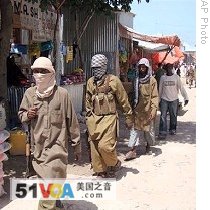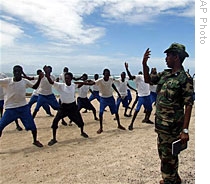Nairobi
06 July 2009
Somalia's U.N.-backed government has dismissed an ultimatum issued by the country's al-Shabab extremist group for government forces to surrender their weapons within five days. Somali leaders are counting on the arrival of more African Union peacekeepers in Somalia to help defend against rebel attempts to topple the government.
 |
| Armed Al-Shabaab fighters patrol Bakara Market in Mogadishu, Somalia, 29 Jun 2009 |
The speaker, identified as al-Shabab's reclusive leader Ahmed Abdi Godane, also known as Abu Zubayr, said government forces have five days to surrender their weapons to al-Shabab and return to their homes. He says government leaders will be put on trial, charged with killing civilians and encouraging the re-occupation of Somalia by foreign armies.
Godane was referring to an urgent appeal the government made last month for neighboring countries to send troops to Somalia to prevent the besieged government from being toppled.
The government's defense chief, Mohamed Siad Yusuf "Inda'ade," dismissed the threat, describing Godane as a man who is so afraid of being seen, he wears women's clothing as a disguise.
Godane was trained by al-Qaida in Afghanistan and is believed to have planned several terrorist attacks in his native Somaliand. He began taking on a more visible role in al-Shabab after a U.S. missile strike killed the al-Shabab's founder and leader, Aden Hashi Ayro, in May, 2008.
 |
| New Somali navy recruits train near the old seaport in northern Mogadishu, 10 Jun 2009 |
Two months of fighting in the capital Mogadishu between the rebels and government forces have killed more than 300 people and have displaced nearly 200,000 others. In the past month, several government officials, including the country's security minister, have been assassinated.
The militants control most of southern Somalia. But their attempts to seize power in Mogadishu have been blocked by the presence of 4,300 African Union peacekeepers from Uganda and Burundi. The government says as many as 1,000 foreigners are now in Somalia, fighting alongside al-Shabab and Hisbul Islam forces.
African Union peacekeepers first arrived in March, 2007 to guard key sites in the capital and to provide humanitarian assistance. At last week's African Union summit in Libya, Somali government officials and western diplomats urged the pan-African body to strengthen the mandate of the mission so that A.U. troops could also track and pursue the rebels.
Somali Prime Minister Omar Abdirashid Ali Sharmarke said Sunday his government has received assurances from the African Union that additional help will soon be on the way.
The Somali leader says the government has received a firm pledge for additional peacekeepers to be deployed in Somalia and a change in the mandate to allow them to fight alongside government forces. Mr. Sharmarke did not give further details.
The United States, which lists al-Shabab as a terrorist organization, has acknowledged sending arms and providing military training worth just less than $10 million to Somalia's shaky government. Washington has pledged to continue supporting the government militarily, but has ruled out sending U.S. troops.
Analysts say even without American troops, the move is risky because any arms sent to Somalia could end up being diverted to the insurgents. Last month, at least 30 disgruntled government soldiers quit their posts and joined the rebel group, Hisbul Islam.